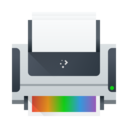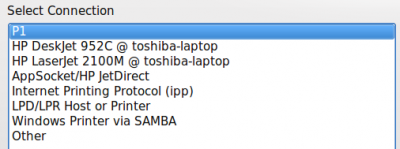Configuration du système/Imprimantes
Configuration de l'imprimante
 |
Utiliser cet outil pour connecter votre ordinateur à une imprimante et configurer des options appropriées |
Liste des fonctionnalités
- Ajouter une imprimante à votre ordinateur
- Donner un nom approprié à chaque imprimante pour mieux l'identifier
- Effectue des tests pour l'imprimante ainsi que de la maintenance
- Enlever une imprimante

Lorsqu'une imprimante n'est pas connectée directement à votre ordinateur avec un câble USB, vous devrez utiliser l'utilitaire Configuration de l'imprimante pour ajouter l'imprimante, par exemple lorsqu'un autre ordinateur a partagé une imprimante ou que vous souhaitez vous connecter. directement à une imprimante connectée à un serveur d'impression.
Exemple
Suivez ces exemples d'étapes pour ajouter à votre ordinateur une imprimante connectée au réseau. Tout d’abord, rassemblez les informations sur votre imprimante avant de commencer (marque, modèle, numéro IP, etc.).
Accéder au programme est une séquence d’étapes simples.
- KDE
- Une fois que vous accédez à l'outil , cliquez sur le bouton pour ajouter une imprimante (Recherchez et cliquez sur le bouton entre les étapes).
- Votre ordinateur recherchera sur votre réseau local les imprimantes qui ont été partagées sur d'autres ordinateurs ou qui sont directement connectées au réseau.
Dans cet exemple, j'ai un « HP Laserjet 2100M » qui est connecté directement à mon réseau à l'aide d'un petit serveur d'impression sur l'imprimante.
L'illustration suivante montre également que j'ai un autre ordinateur partageant deux imprimantes sur un ordinateur portable « Toshiba ». Si je voulais utiliser l’un ou l’autre, cet autre ordinateur devrait être allumé pour que l’imprimante fonctionne. Les imprimantes distantes fonctionnent mieux si elles sont directement connectées au réseau ou si elles sont connectées à un ordinateur serveur d'impression dédié.

- Je choisis qui est le choix pour mon serveur d'impression.

- J'entre le Numéro d'adresse IP dans le champ Hôte (actuellement, l'outil Configuration de l'imprimante n'identifie pas quel est ce numéro, vous devrez donc demander à votre administrateur réseau quel est le numéro. l'adresse IP est).
- Choisissez le fabricant (le mien est HP)
- Choisissez le modèle (HP en a plusieurs)
- Choisissez le pilote recommandé, sauf si vous avez une raison de faire autrement.
- Donnez à l'imprimante un nom utile, car "imprimante" n'est peut-être pas suffisant.
- Donnez une description incluant l'emplacement physique si ce n'est pas dans votre propre chambre.
- L'"Emplacement" est par défaut le nom de votre ordinateur au cas où vous décideriez de le partager plus tard. Le partage est l'une des options de l'outil de configuration de l'imprimante.
Sur l'écran de configuration, vous verrez maintenant une nouvelle « Imprimante locale » car l'imprimante est « connectée » à votre ordinateur. Si vous possédez plusieurs imprimantes, veillez à en sélectionner une judicieusement par défaut. Vous ne souhaiterez peut-être pas définir la grande imprimante/copieur départementale à grande vitesse du bureau du chef de département par défaut si vous disposez d'une petite imprimante directement connectée à votre ordinateur.


